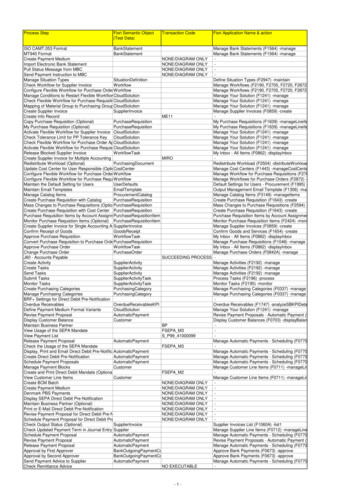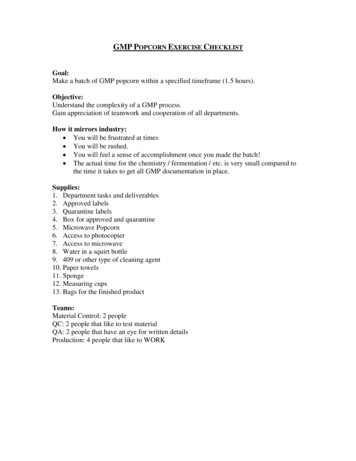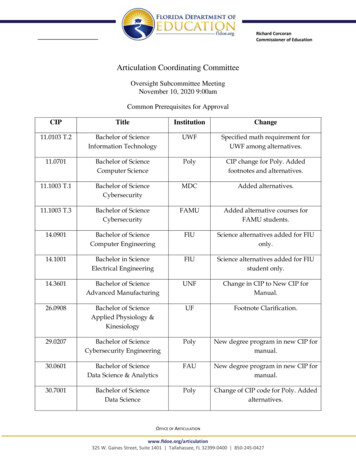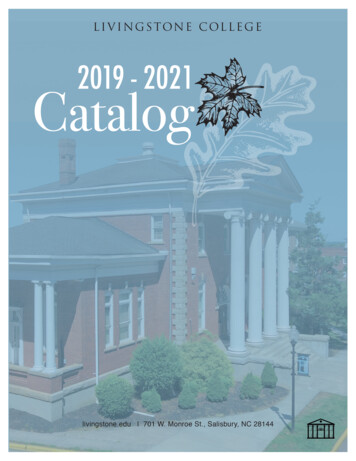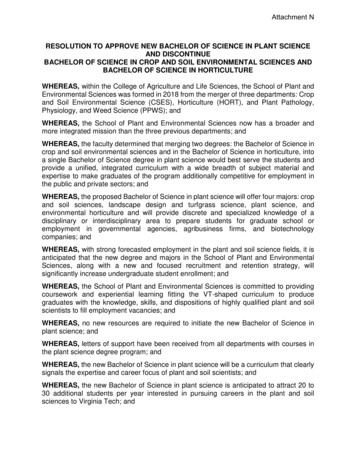
Transcription
Attachment NRESOLUTION TO APPROVE NEW BACHELOR OF SCIENCE IN PLANT SCIENCEAND DISCONTINUEBACHELOR OF SCIENCE IN CROP AND SOIL ENVIRONMENTAL SCIENCES ANDBACHELOR OF SCIENCE IN HORTICULTUREWHEREAS, within the College of Agriculture and Life Sciences, the School of Plant andEnvironmental Sciences was formed in 2018 from the merger of three departments: Cropand Soil Environmental Science (CSES), Horticulture (HORT), and Plant Pathology,Physiology, and Weed Science (PPWS); andWHEREAS, the School of Plant and Environmental Sciences now has a broader andmore integrated mission than the three previous departments; andWHEREAS, the faculty determined that merging two degrees: the Bachelor of Science incrop and soil environmental sciences and in the Bachelor of Science in horticulture, intoa single Bachelor of Science degree in plant science would best serve the students andprovide a unified, integrated curriculum with a wide breadth of subject material andexpertise to make graduates of the program additionally competitive for employment inthe public and private sectors; andWHEREAS, the proposed Bachelor of Science in plant science will offer four majors: cropand soil sciences, landscape design and turfgrass science, plant science, andenvironmental horticulture and will provide discrete and specialized knowledge of adisciplinary or interdisciplinary area to prepare students for graduate school oremployment in governmental agencies, agribusiness firms, and biotechnologycompanies; andWHEREAS, with strong forecasted employment in the plant and soil science fields, it isanticipated that the new degree and majors in the School of Plant and EnvironmentalSciences, along with a new and focused recruitment and retention strategy, willsignificantly increase undergraduate student enrollment; andWHEREAS, the School of Plant and Environmental Sciences is committed to providingcoursework and experiential learning fitting the VT-shaped curriculum to producegraduates with the knowledge, skills, and dispositions of highly qualified plant and soilscientists to fill employment vacancies; andWHEREAS, no new resources are required to initiate the new Bachelor of Science inplant science; andWHEREAS, letters of support have been received from all departments with courses inthe plant science degree program; andWHEREAS, the new Bachelor of Science in plant science will be a curriculum that clearlysignals the expertise and career focus of plant and soil scientists; andWHEREAS, the new Bachelor of Science in plant science is anticipated to attract 20 to30 additional students per year interested in pursuing careers in the plant and soilsciences to Virginia Tech; and
Attachment NWHEREAS, with the approval of the Bachelor of Science in plant science degree, theBachelor of Science in crop and soil environmental sciences and Bachelor of Science inhorticulture will be discontinued; nowTHEREFORE, BE IT RESOLVED that the Bachelor of Science in plant science be approved andthe proposal forwarded to the State Council of Higher Education for Virginia (SCHEV) for approvaland to the Southern Association of Colleges and Schools Commission on Colleges (SACSCOC)for notification; and that the Bachelor of Science in plant science be effective upon approval bySCHEV; andBE IT FURTHER RESOLVED that the Bachelor of Science in crop and soil environmentalsciences and Bachelor of Science in horticulture be discontinued effective spring 2026, and theproposal forwarded to the State Council of Higher Education for Virginia (SCHEV) for approval,and to the Southern Association of Colleges and Schools Commission on Colleges (SACSCOC)for notification.RECOMMENDATION:That the Board of Visitors approve the resolution to approve a new Bachelor of Science degreein plant science and discontinue two degrees: Bachelor of Science in crop and soil environmentalsciences, and Bachelor of Science in horticulture.June 8, 2021
Attachment NTable of ContentsDescription of Proposed Program. 1Background . 1Degree Programs to be Discontinued . 1Curriculum . 2Student Assessment . 8Employment Skills/Workplace Competencies . 11Program Assessment . 13Benchmarks of Success. 14Justification for the Proposed Program . 14Rationale for Proposed Merge Degree Program . 14Student Demand . 15Projected Student Enrollment . 15Duplication . 16Projected Resource Needs for the Proposed Program . 16Resource Needs . 16Appendices . 21Appendix A Sample Plans of Study. A-1Appendix B Course Descriptions. B-1
Attachment NDescription of Proposed ProgramBackgroundVirginia Tech College of Agriculture and Life Sciences requests approval to merge two-degreeprograms and create a new Bachelor of Science (B.S.) in Plant Science (01.1101). The twoprograms to be merged include the B.S. in Crop and Soil Environmental Sciences (01.1102) andthe B.S. in Horticulture (01.1103). The proposed B.S. in Plant Science would be initiated inSpring 2022 and housed in the School of Plant and Environmental Sciences.The purpose of the proposed B.S. in Plant Science degree is to train students to improve theproductivity, utilization, and sustainability of crops and plants. Students will obtain a thoroughgrounding through the plant science core in plant biology, genetics, and pathology, as well as inthe four major disciplinary areas in plant science (Crop and Soil Sciences, Landscape Design andTurfgrass Science, Plant Science, and Environmental Horticulture) which will enable them toapply this information to improve the quality, quantity, and safety of agricultural products.Graduates of the proposed program will be able to conduct, analyze, and interpret agriculturaldata to formulate effective questions and strategies to improve the growth and productivity ofplants and crops as well as communicate this information effectively to stakeholders and thepublic.The proposed degree program will offer four majors: 1) Crop and Soil Sciences, 2) LandscapeDesign and Turfgrass Science, 3) Plant Science, and 4) Environmental Horticulture. Each majorwill provide a discrete and specialized knowledge of a disciplinary or interdisciplinary area thatwill prepare graduates for employment in that field.The School of Plant and Environmental Sciences (SPES) was formed in July 2018 by mergingthree departments: Crop and Soil Environmental Sciences, Horticulture, and Plant Pathology,Physiology, and Weed Science. This merger prompted the newly integrated faculty to conveneand discuss options for the undergraduate programs, which consisted of three B.S. degreesspanning the three former departments. From these discussions, it was determined that themerger of two degrees, the B.S. in Crop and Soil Environmental Sciences and the B.S. inHorticulture, into one B.S. in Plant Science degree would best serve the students by providing aunified, integrated curriculum with a wider breadth of subject material and expertise that wouldmake graduates of the program more competitive for jobs in the public and private sector. Theproposed degree gives students an opportunity to explore the field of plant science as a wholebefore committing to a specific plant science sub discipline. The unification of its core coursesensures that all students in the plant science program get the foundational knowledge required toexcel in the agricultural and plant science fields while providing opportunities for specializationand proficiency in a specific discipline. The proposed B.S. in Plant Science degree program willbe the foundation of an exciting and flexible curriculum designed to train a new generation ofstudents to meet the demand of agriculture, the green industry, and general plant sciences.Degree Programs to be DiscontinuedVirginia Tech will discontinue: the B.S. in Crop and Soil Environmental Sciences (01.1102) andthe B.S. in Horticulture (01.1103) located in the School of Plant and Environmental Sciences inthe College of Agriculture and Life Sciences. Documentation to discontinue these programs is1
Attachment Nincluded with this submission.CurriculumThe proposed B.S. in Plant Science degree program will require 120 credit hours. The programrequires a capstone course. Four majors will be offered: Crop and Soil Sciences, LandscapeDesign and Turfgrass Science, Plant Science, and Environmental Horticulture.The core coursework provides the foundational principles of plant biology, genetics, diseases,and disease-causing agents. This knowledge helps students to understand how plants grow andhow the physical, chemical, mineralogical, and biological properties of the soil and environmentaffect crop and plant development and quality. Students will also develop the skills necessary tocommunicate effectively in professional contexts with technical and non-technical audiencesincluding interpersonal skills needed for group leadership and meeting management.In the capstone course, students develop an agricultural action plan that explains bestmanagement practices for producing a specific crop, managing a particular landscape, protectingsoil and water quality, or bringing a new plant product to market. Students also develop andjustify an annual budget and maintenance plan for a sports field complex or an annual croprotation plan of corn, wheat, or soybean. This allows students to refine and practice skills incommunication, critical thinking, problem solving, cross functional knowledge, writtencommunication, and team work.The required majors provide an opportunity to build on a strong foundational plant science corewith more specialized knowledge in a disciplinary (or potentially cross disciplinary) area of plantscience. Majors in the proposed degree include Crop and Soil Sciences, Landscape Design andTurfgrass Science, Plant Science, and Environmental Horticulture.One new course was developed for the proposed B.S. in Plant Science degree program. Newcourses are denoted with an asterisk (*).Program RequirementsGeneral Education Courses: 45 credit hoursDiscourse (3 credits)ENGL 1105: First-Year Writing (3 credits)ENGL 1106: First-Year Writing (3 credits)Critical Thinking in the Humanities (6 credits)Reasoning in the Social Sciences (3 credits)AAEC 1005: Economic of the Food and Fiber System (3 credits), OrECON 2005: Principles of Economics (3 credits)Reasoning in the Natural Sciences (6 credits)Quantitative and Computational Thinking (9 credits)Critique and Practice in Design and the Arts (6 credits)Critical Analysis of Identity and Equity in the United States (3 credits)2
Attachment NCore Courses: 25 credit hoursALCE 3624: Communicating Agriculture and Life Sciences in Writing (3 credits), OrALCE 3634: Communicating Agriculture and Life Sciences in Speaking (3 credits)ALS 1234: CALS First Year Seminar (1 credit)BIOL 1105: Principles of Biology (3 credits)BIOL 1106: Principles of Biology (3 credits)ENSC 1015: Foundations of Environmental Science (3 credits)HORT/BIOL 2304: Plant Biology (3 credits)PPWS 2104: Plants, Genes, and People (3 credits)PPWS 4104: Plant Pathology (4 credits)Capstone Course: 2 credit hours*SPES 4864: Plant Sciences Capstone (2 credits)Major AreasStudents must choose one of the following majors.Crop and Soil Sciences Major: 39 credit hoursThe proposed major in Crop and Soil Sciences (CSS) prepares students for crop and soilmanagement careers in the private and public sectors. Students in this major learn theprinciples of soil chemistry and nutrient management, pest management, and plantingand harvesting operations to improve growth and yield of large-scale agronomic crops.Crop and Soil Science Major Core Courses: 21 credit hoursAAEC 2434: Foundations of Agribusiness (3 credits)CHEM 1045: General Chemistry Laboratory (1 credit)CHEM 1046: General Chemistry Laboratory (1 credit)CSES 2444: Agronomic Crops (3 credits)CSES/ENSC 3114/GEOS 3614: Soils (3 credits)CSES/ENSC 3124/GEOS 3624: Soils Laboratory (1 credit)CSES 4144: Plant Breeding and Genetics (3 credits)CSES 4214: Soil Fertility and Management (3 credits)ENT 4254: Insect Pest Management (3 credits)Restricted Electives: 18 credit hoursStudents choose a combination of courses that total 18 credits from a restricted list of courses.AAEC 2104: Personal Financial Planning (3 credits)AAEC 3004: Agricultural Production and Consumption Economics (3 credits)AAEC 3314: Environmental Law (3 credits)AAEC 3504: Marketing Agricultural Products (3 credits)AAEC 3604: Agricultural Law (3 credits)ALS 3404: Ecological Agriculture: Theory and Practice (3 credits)BIOL 2804: Ecology (3 credits)3
Attachment NCSES 2244: Agriculture, Global Food Security and Health (3 credits)CSES 2434: Crop Evaluation (3 credits)CSES 2564: Turfgrass Management (3 credits)CSES 3144: Soil Description and Interpretation (3 credits)CSES/HORT 3444: World Crops and Cropping Systems (3 credits)CSES/ENSC 3614: Soil Physical and Hydrological Properties (3 credits)CSESENSC 3644: Plant Materials for Environmental Restoration (3 credits)CSES/ENSC 4134: Soil Genesis and Classification (3 credits)CSES/FREC 4334: Principles and Practice of Agroforestry (3 credits)CSES 4344: Crop Physiology and Ecology (3 credits)CSES 4544: Forage Crop Ecology (3 credits)CSES/CHEM/ENSC 4737: Environmental Soil Chemistry (3 credits)CSES/ENSC 4774: Reclamation of Drastically Disturbed Lands (3 credits)CSES/ENSC 4854: Wetland Soils and Mitigation (3 credits)ENT 2004: Insects and Human Society (3 credits)ENT/PPWS 4264: Pesticide Usage (3 credits)HORT 2184: Plants, Places, and Cultures in a Global Context (3 credits)HORT 2234: Environmental Factors in Horticulture (3 credits)HORT 4064: Soil Microbiology (3 credits)PPWS 2754: Weeds that Shape Our World (3 credits)PPWS 4604: Biological Invasions (3 credits)Landscape Design and Turfgrass Science Major: 39 credit hoursThe proposed major in Landscape Design and Turfgrass Science prepares students for careers inthe public and private sector. Students in this major learn to design, build, and manage beautifuland functional landscapes using science-based practices that improve the living environment andcontribute to environmental sustainability. Students choose a concentration area that best meetstheir chosen career path: Landscape Industry or Turfgrass Management Industry. Studentschoosing the Landscape Industry concentration learn principles related to the design, installation,and maintenance of different types of landscapes in the public and private sectors. Studentschoosing the Turfgrass Management concentration learn principles related to the care andmanagement of lawns, landscapes, golf courses, and athletic fields.Landscape Design and Turfgrass Science Major Core Courses: 21 credit hoursAAEC 2434: Foundations of Agribusiness (3 credits)AAEC/MGT 3454: Small Business Management and Entrepreneurship (3 credits)CSES 2564: Turfgrass Management (3 credits)CSES/ENSC 3114/GEOS 3614: Soils (3 credits)CSES/ENSC 3124/GEOS 3624: Soils Laboratory (1 credit)ENT 4254: Insect Pest Management (3 credits)HORT 2224: Horticulture Science and Industry (2 credits)HORT 2234: Environmental Factors in Horticulture (3 credits)Landscape Design Concentration Requirements: 11 creditsHORT 3324: Herbaceous Landscape Plants (3 credits)HORT 3325: Woody Landscape Plants (3 credits), Or4
Attachment NHORT 3326: Woody Landscape Plants (3 credits)HORT 4504: Landscape Contracting (2 credits)HORT 4545: Small Scale and Residential Landscape Design (4 credits)Landscape Design Concentration Restricted Electives: 7 credit hoursStudents choose a combination of courses that total 7 credits from a restricted list of courses.ALS 3404: Ecological Agriculture: Theory and Practice (3 credits)ENT 2004: Insects and Human Society (3 credits)ENT/PPWS 4264: Pesticide Usage (3 credits)CSES/ENSC 3644: Plant Materials for Environmental Restoration (3 credits)HORT 2144: Indoor Plants (3 credits)HORT 2164: Floral Design (3 credits)HORT 2184: Plants Places Culture Globally (3 credits)HORT 2244: Plant Propagation (3 credits)HORT/FREC 3354: Trees in the Built Environment (3 credits)HORT/CSES 3444: World Crops and Systems (3 credits)HORT 4205: Public Gardens Maintenance and Management (1 credit)HORT 4206: Public Gardens Maintenance and Management (1 credit)HORT 4546: Small Scale and Residential Landscape Design (4 credits)HORT 4614: Ornamental Plant Production and Marketing (3 credits)Turfgrass Science Concentration: 6 credit hoursCSES 3564: Golf and Sports Turf Management (3 credits)CSES 4214: Soil Fertility and Management (3 credits)Turfgrass Science Concentration Restricted Electives: 12 credit hoursStudents choose a combination of courses that total 12 credits from a restricted list of courses.ALCE 3014: Leadership Effectiveness for Professionals in Agricultural Organization (3 credits)ENT 2004: Insects and Human Society (3 credits)ENT/PPWS 4264: Pesticide Usage (3 credits)HORT 2144: Indoor Plants (3 credits)HORT 2184: Plants Places Culture Globally (3 credits)HORT 2244: Plant Propagation (3 credits)HORT 4205: Public Gardens Maintenance and Management (1 credit)HORT 4206: Public Gardens Maintenance and Management (1 credit)HORT 4546: Small Scale and Residential Landscape Design (4 credits)Plant Science Major: 36-38 credit hoursThe proposed major in Plant Science prepares students for careers in the private and publicsectors that deal with plant breeding and genetics. Students learn the principles of biology andmolecular biology, chemistry and biochemistry, genetics, and plant science as they relate tocreating new varieties of plants, plant pathology, and weed science. Students also learn to usebiotechnological techniques and conventional methods to improve plant health and productivity.5
Attachment NPlant Science Major Core Courses: 21-23 credit hoursBCHM 3114: Biochemistry for Biotechnology and the Life Sciences (3 credits), OrBCHM 4115: General Biochemistry (4 credits)CHEM 1045: General Chemistry Laboratory (1 credit)CHEM 1046: General Chemistry Laboratory (1 credit)CHEM 2535: Organic Chemistry (3 credits)CHEM 2536: Organic Chemistry (3 credits)CHEM 2545: Organic Chemistry Laboratory (1 credit)CHEM 2546: Organic Chemistry Laboratory (1 credit)CSES 2444: Agronomic Crops (3 credits), OrHORT 2224: Horticulture Science and Industry (2 credits)CSES 4144: Plant Breeding and Genetics (3 credits)CSES 4344: Crop Physiology and Ecology (3 credits)Plant Science Major Restricted Electives: 15 credit hoursStudents choose a combination of courses that total 15 credits from a restricted list of courses.ALS 3404: Ecological Agriculture: Theory and Practice (3 credits)BCHM 2114: Biochemical Calculations (3 credits)BCHM/APSC 4054: Genomics (3 credits)BCHM 4116: General Biochemistry (4 credits)BIOL 2004: Genetics (3 credits)BIOL 2104: Cell and Molecular Biology (3 credits)BIOL 4134: Evolutionary Genetics (3 credits)BIOL 4334: Chemical Ecology (3 credits)CSES/ENSC 3134: Soils in the Landscape (3 credits)CSES/HORT 3444: World Crops and Cropping Systems (3 credits)CSES/FREC 4334: Principles and Practices of Agroforestry (3 credits)CSES 4544: Forage Crop Ecology (3 credits)HORT 2184: Plants, Places, and Cultures in a Global Context (3 credits)HORT 2234: Environmental Factors in Horticulture (3 credits)HORT 4064: Soil Microbiology (3 credits)HORT 4794: Medicinal Plants and Herbs (3 credits)PPWS 2004: Mysterious Mushrooms, Malicious Molds (3 credits)PPWS 2754: Weeds That Shape Our World (3 credits)PPWS 4154: Plant Problem Diagnosis (3 credits)PPWS 4604: Biological Invasions (3 credits)PPWS 4994: Undergraduate Research (3 credits)Environmental Horticulture Major: 44 credit hoursThe proposed major in Environmental Horticulture prepares students for careers in theprivate and public sectors that deal with non-agronomic crops (i.e., do not occupy largeacreage). Students in this major learn the principles related to producing floriculture andnursery plants to produce and maintain sustainable vegetables, fruits, and nursery crops.Students in this major will learn skills necessary to own or operate a nursery,greenhouse, or related business in the business requirement.6
Attachment NEnvironmental Horticulture Major Core Courses: 23 credit hoursCSES/ENSC 3134: Soils in the Landscape (3 credits)ENT 4254: Insect Pest Management (3 credits)HORT 2224: Horticulture Science and Industry (2 credits)HORT 2234: Environmental Factors in Horticulture (3 credits)HORT 2244: Plant Propagation (3 credits)HORT 3324: Herbaceous Landscape Plants (3 credits)HORT 3325: Woody Landscape Plants (3 credits), OrHORT 3326: Woody Landscape Plants (3 credits)HORT 4324: Greenhouse Management (3 credits)Environmental Horticulture Major Business Requirement: 6 credit hoursAAEC 2434: Foundations of Agribusiness (3 credits)AAEC/MGT 3454: Small Business Management and Entrepreneurship (3 credits)Environmental Horticulture Restricted Electives: 15 credit hoursStudents choose a combination of courses that total 15 credits from a restricted list of courses.AAEC 2104: Personal Financial Planning (3 credits)AAEC 3004: Agricultural Production and Consumption Economics (3 credits)AAEC 3314: Environmental Law (3 credits)ALS 2204: Introduction to Civic Agriculture (3 credits)ALS 3404: Ecological Agriculture: Theory and Practice (3 credits)BIOL 2004: Genetics (3 credits)CHEM 1045: General Chemistry Laboratory (1 credit)CHEM 1046: General Chemistry Laboratory (1 credit)CHEM 2535: Organic Chemistry (3 credits)CHEM 2536: Organic Chemistry (3 credits)CHEM 2545: Organic Chemistry Laboratory (1 credit)CHEM 2546: Organic Chemistry Laboratory (1 credit)CSES 2444: Agronomic Crops (3 credits)CSES 2564: Turfgrass Management (3 credits)CSES/HORT 3444: World Crops and Systems (3 credits)CSES 4214: Soil Fertility and Management (3 credits)ENT 2004: Insects and Human Society (3 credits)ENT/PPWS 4264: Pesticide Usage (3 credits)HORT/FREC 2134: Plants and Greenspaces in Urban Communities (3 credits)HORT 2144: Indoor Plants (3 credits)HORT 2164: Floral Design (3 credits)HORT 2184: Plants, Places, and Cultures in a Global Context (3 credits)HORT 2834: Sustainable Agriculture Practicum (3 credits)HORT/FREC 3354: Trees in the Built Environment (3 credits)HORT 3664: Hardscape Materials & Installation (3 credits)HORT 4064: Soil Microbiology (3 credits)7
Attachment NHORT 4205: Public Gardens Maintenance and Management (1 credit)HORT 4206: Public Gardens Maintenance and Management (1 credit)HORT 4504: Landscape Contracting (3 credits)HORT 4545: Small Scale and Residential Landscape Design (4 credits)HORT 4546: Small Scale and Residential Landscape Design (4 credits)HORT 4614: Ornamental Plant Production and Marketing (3 credits)HORT 4654: Viticulture (3 credits)HORT 4764: Vegetable Crops (3 credits)HORT 4784: Vegetable Seed Production (3 credits)HORT 4794: Medicinal Plants and Herbs (3 credits)Free Elective Courses: 6-14 credit hoursStudents will be required to take electives to complete the degree program. Electives can betaken from any courses offered in the university.Total Degree Program: 120 credit hoursSee Appendix A for a sample plans of study.See Appendix B for course descriptions.Student AssessmentStudents in the proposed B.S. in Plant Science degree program will be assessed in core coursesthrough specific pieces of student work such as papers, presentations, case studies, lab reports,and exams. Rubrics associated with student work will be developed by instructors to assess eachlearning outcome. Learning outcomes are delivered across the curriculum such that each studentis exposed to each learning outcome several times throughout the curriculum.The capstone course, SPES 4864: Capstone in Plant Sciences, will be used to assess the student’swriting and public speaking skills and knowledge synthesis in the plant sciences. The Capstonecourse uses an experiential learning experience to apply the knowledge and skills obtainedduring the degree program. The agricultural action plan, in the form of oral and written reports,will be used to assess achievement of outcomes. Student work (direct measures) will be scoredon rubrics for assessing the competency level of each learning outcome. Each learning outcomewill be assessed twice in a five-year cycle and reviewed by Virginia Tech Office of AcademicDecision Support. In addition, after each measurement year, the Undergraduate CurriculumCommittee will meet to review assessment findings. The committee will discuss making thenecessary curricular changes based on findings.Learning OutcomesThe learning outcomes for core curriculum of the proposed merged B.S. degree willconsist of the following: Apply foundational principles, processes, and functions of plant growth andreproduction to improve the quality, quantity, and safety of agricultural products.Utilize the fundamental ecological principles associated with nutrient cycling, energyflow, biodiversity, and their relationships to agriculture, food production, andpopulation growth.8
Attachment N Explain how humans have genetically altered major agricultural crops from prehistoryto the current age of biotechnology.Present agriculture and plant science data and other information to a scientific andnon-scientific audience.Apply principles of plant disease diagnosis and biology to identify plant diseasecausing agents and manage plant diseases.The proposed B.S. in Plant Science contains four majors: Crop and Soil Sciences, EnvironmentalHorticulture, Landscape Design and Turfgrass Science, and Plant Science. The learningoutcomes for each major are as follows.Crop and Soil Sciences Apply production fundamentals of major agronomic crops grown in Virginia. Describe how the environment influences plant growth and crop yields. Discuss ways to modify the environment to improve plant growth and yields. Apply principles underpinning soil fertility in agronomic crops to optimize productionand protect the environment. Apply farm and nutrient management plans to improve sustainability. Use principles of integrated pest management to improve agronomic crop production.Landscape Design and Turfgrass Science Advise lawncare or landscape firms on common herbaceous and woody plants used forlandscaping and turfgrass management in Virginia. Apply principles of soil fertility to improve landscape and turfgrass plants. Analyze existing landscapes as to aesthetics and function to develop renovation plans. Evaluate sales and marketing plans for landscape design or turfgrass management.Plant Science Apply concepts of plant biology at genetic, molecular, physiological, and organismallevels to increase efficiency in cellular processes related to agriculture and plantscience. Apply principles and methods of plant breeding and selection. Evaluate how genetics, management systems and environmental inputs influence plantdevelopment and pathology. Use knowledge acquired from chemistry and biology towards cellular or whole plantmanipulations to improve plant function or output.Environmental Horticulture Describe production fundamentals of major horticultural crops grown in Virginia toscientific and non-scientific audiences. Apply principles of greenhouse management to produce plants in a sustainable manner. Propagate, establish and care for commonly used herbaceous and woody ornamentalplants. Use principles of integrated pest management to improve horticultural plants. Analyze sales and marketing plans for fruit, vegetable, and nursery/greenhouse crops.9
Attachment NCurriculum Map for B.S. in Plant ScienceLearning OutcomeKey coursesApply foundational principles, BIOL 1105: Principles ofprocesses, and functions of plant Biologygrowth and reproduction toBIOL 1106: Principles ofimprove the quality, quantity, Biologyand safety of agriculturalHORT/BIOL 2304: Plantproducts.BiologySPES 4864: Plant SciencesCapstoneUtilize fundamental ecologicalprinciples associated withnutrient cycling, energy flow,biodiversity, and theirrelationships to foodproduction and populationgrowth.ENSC 1015: Foundations ofEnvironmental ScienceSPES 4864: Plant SciencesCapstoneAssessment MeasuresFormative: Weekly quizzesbased on assigned textbookchapter readings
Attachment N. WHEREAS, with the approval of theBachelor of Science in . plant science degreethe , . Turfgrass Science, Plant Science, and Environmental Horticulture) which will enable them to apply this info

